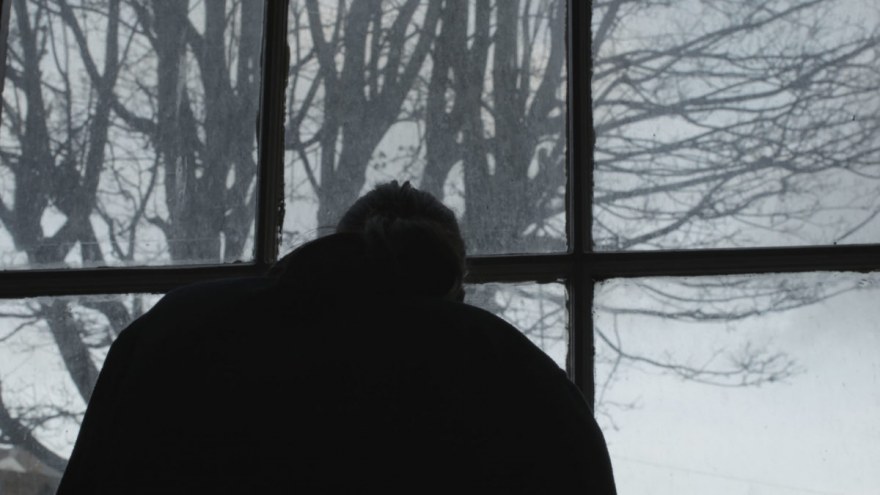Breakfast with Camrex
An interview with Mark Chapman, director of Camrex
How did you discover the Camrex Hostel ? Where is it based ?
Camrex is based in Sunderland –a city that has a rich industrial history and was formerly a major shipbuilding hub in North East, England. I was casting a drama feature and the project involved extensive work with non-actors and lots of street casting. I met an ex-drug dealer, who told me that after serving his last prison sentence he had been released into a hostel called Camrex House; a city-centre hostel with a notorious reputation. My casting work had taken me to numerous hostels, but Camrex felt like a step into the dark. After production on the feature was finished, I decided to go back and explore the characters and environment through a photography project.
How was the first contact with people living there ?
My method of working begins by using a stills camera – for Camrex I used an old Polaroid SX-70 – to explore the subject, reveal the location, build relationships with characters and develop an image system. It was a wet hostel -meaning cheap alcohol could be purchased on the premises- so some of the residents never left the building. As an outsider I was initially viewed with some suspicion, but I kept going back to talk to the residents and spend time in the environment. At that stage the intention was to create a photographic work that could exist on its own terms. Later on, it became clear there were certain atmospheres, characters and stories that would be compelling when rendered as a film narrative. Obviously, with the switch in medium comes a new set of challenges, but by that point the residents were used to my presence and I had developed a good working knowledge of the hostel. Shortly after introducing the video camera the story of Derek stabbing a seagull to death emerged and I knew that that strange, violent image was my access point with which to communicate the atmosphere of the environment.
You previous film dealt with still photography. Why did you choose to use moving images for this project?
The Camrex project is part of a multi-platform work consisting of a 15-minute film and a set of still photographs (the photographs can be viewed here: www.mark-chapman.co.uk/three). Trans, my previous film, was a hybrid of photographic and cinematic technique; a photo-montage that used slow shutter speeds to capture movement that was then reconstructed as eleven video sequences by dissolving the images together. For Camrex, I knew I wanted to have a similar level of control over the images, but combine this with a more expressive edit. The hostel had distinctive cinematic possibilities and so required a different treatment.
.
.
Images and sounds are not synchronized. Did you first start to record images or sounds?
As with my previous films, I recorded a series interviews with the characters and then devised scenes in response. This also incorporated off-camera discussions with the residents and my own observations and ideas. Through this method, the film’s grammar developed alongside the revealing of the characters’ relationship to each other and the hostel. I filmed for around eight days spread across a few months. This allowed time for my two main characters, Derek and Matthew, to really invest in the filmmaking process. That kind of investment is always important, but particularly so here due to the performative nature of the scenes we were shooting. Neither of them had been in front of a camera before.
During editing, I stripped the voice-over down to its essential elements. This gives both the words and the pauses real impact, and allows an audience the time to engage in a deeper way.
How did you approach the occupants? Did you film them in direct cinema’s style or did you direct them?
The film is almost entirely constructed. They’re essentially actors in their own stories and we do as many takes as I need to do. I’m interested in an expressive use of image and sound to explore the interior life of my characters; the intimate, subjective and sensory. I knew I wouldn’t have been able to achieve the kinds of images I wanted through straight observation. However, you have to cast very carefully because this method requires significant commitment from the contributors.
Can you tell us more about the guy with the air rifle? He has some suprising sentences when he is shooting on a woman’s poster.
Matthew had over 120 criminal convictions and some of those had been for sex crimes. He had been through young offender’s institutions and prison and, of course, sex offenders aren’t treated well there. As a result, he saw everyone as a potential threat, and his way to combat this was to externalise these pressures. He was confrontational physically and verbally and so the scene is presented as a provocation.
When we were shooting that scene he pointed the rifle at my head and I immediately turned the camera away and stopped filming. I never really felt in danger, but I needed to show him that I considered such an action as overstepping the boundaries of our relationship. A couple of days later he was arrested for burglary and our time filming came to a definitive end.
.
Camrex is being shown in Lab Competition L4.










